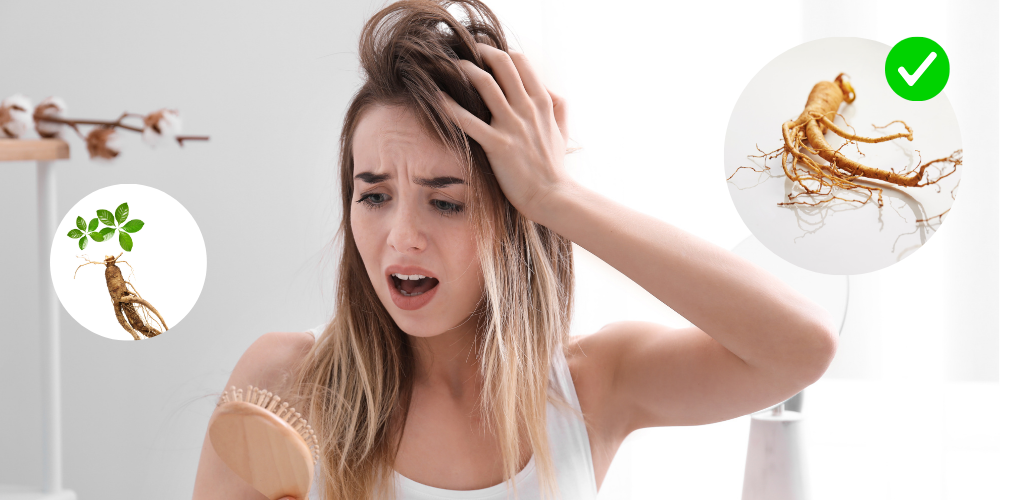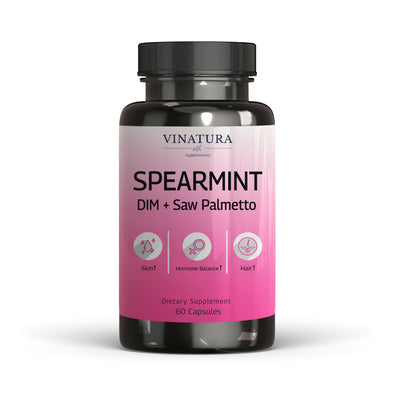
Does Ashwagandha Help With Hair Loss?
Ashwagandha, or Indian ginseng, is a renowned herb in traditional Indian medicine. Ashwagandha offers numerous potential health benefits, including stress reduction, improved energy levels, enhanced immunity, and possibly hair loss prevention. But is this true? Let's explore the following article together.
Before exploring further, please read the disclaimer located at the end of this webpage.
Key Takeaways
- Ashwagandha is known for its stress-reducing properties and improving blood circulation, including in the scalp area.
- Ashwagandha has immune-boosting properties, helping the body fight harmful agents and maintaining healthy hair.
- The dosage of Ashwagandha can be adjusted depending on the individual's health condition and purpose of use.
Does Ashwagandha Help With Hair Loss?
Ashwagandha can indeed reduce hair loss. Hair loss can stem from various reasons, with stress being one of the most common culprits for many people. Ashwagandha is known for its ability to reduce stress and anxiety, helping the body cope better with pressure and thereby reducing the risk of hair loss due to stress.
Moreover, Ashwagandha can improve blood circulation, including in the scalp area. Improved blood circulation can provide more nutrients to hair follicles and promote healthier hair growth.
Most notably, Ashwagandha helps balance hormones, especially those related to hair loss, such as cortisol and testosterone, thus reducing the risk of hair loss.
Read more:
- Tongkat Ali Vs Ashwagandha: What's Better & How To Combine?
- Fadogia Agrestis Vs. Ashwagandha: Which is Right for You?
What Are The Benefits Of Ashwagandha For Hair Health?

Do you ever feel like you're losing overwhelming hair every time you shampoo? Or wake up in the morning to find strands of hair on your pillow? According to numerous studies, 80% of men and half of women experience significant hair loss. And everyone is seeking ways to reduce hair loss and promote hair growth.
Reducing Hair Loss
There isn't enough evidence to suggest that Ashwagandha directly treats hair loss. However, this herb is known for its adaptogenic properties, helping the body manage stress better. Additionally, its anti-inflammatory properties can reduce scalp inflammation, creating a healthy environment for hair growth.
Strengthening Hair
Ashwagandha contains various antioxidants and nutrients that nourish hair follicles, supporting strong hair growth and preventing hair loss. These nutrients protect hair follicles from damaging free radicals while providing essential factors for hair growth.
Enriching Scalp Nourishment

Ashwagandha is rich in vitamins (especially vitamin C), protein, iron, calcium, nitrate, and glucose. These components boost immunity and nourish scalp cells, providing essential nutrients to hair follicles for healthier, stronger hair.
Scalp And Hair Condition
Ashwagandha's main components are "withanolides" and saponins, known for their cleansing and antioxidant properties, which maintain a clean and healthy scalp.
Furthermore, Ashwagandha can promote collagen formation and sebum production on the scalp, improving conditions such as dry, brittle hair and protecting hair from UV rays.
Controlling Scalp Irritation
Ashwagandha contains anti-inflammatory and antibacterial properties that help maintain a healthy scalp. It is rich in antioxidants and prevents issues like itchiness, dandruff, and scalp inflammation.
Reversing Premature Graying
Ashwagandha contains tyrosine, an amino acid that stimulates melanin production in hair follicles, the pigment responsible for hair color. This may slow down the process of premature graying or even reverse it, helping maintain the natural color of hair.
A small study on 60 individuals showed that taking high-concentration Ashwagandha root extract can help improve stress levels and quality of life.[1]
Does Ashwagandha Prevent Hair Loss?
Ashwagandha is generally considered safe for most people when used at appropriate dosages. As mentioned in the article, Ashwagandha has many potential benefits for hair health due to its stress-reducing properties, hormone balancing, and antioxidant support.
However, there are limitations to research on the direct impact of Ashwagandha on hair loss. While some anecdotal reports suggest that Ashwagandha may contribute to hair loss in some rare cases, there isn't significant scientific evidence to support this claim.
Most importantly, it's essential to remember that everyone's reaction to supplements may vary, and some individuals may experience side effects or adverse reactions to certain substances. Suppose you notice any unexpected changes, including hair loss, after starting Ashwagandha. In that case, it's advisable to discontinue use and consult a healthcare professional to determine the cause and appropriate course of action.
How To Use Ashwagandha For Hair Health?

- Follow Dosage Guidelines: Ashwagandha supplements are available in various forms, including capsules, powder, and liquid extract. A daily dosage of around 500-600 mg of extract is recommended for overall health benefits. However, your doctor may suggest a different dosage based on your body and needs.
- Topical Application: You can also use Ashwagandha topically by preparing a hair mask or oil infused with Ashwagandha extract. Mix Ashwagandha powder or extract with a carrier oil like coconut, olive, or almond oil, and massage it into the scalp. This can help moisturize the scalp, improve blood circulation, and promote hair strength.
- Combine with Other Ingredients: You can enhance the benefits of Ashwagandha for hair health by combining it with other natural ingredients known for their hair-nourishing properties. For example, mix Ashwagandha powder with amla powder (Indian gooseberry), Brahmi powder (Bacopa monnieri), or fenugreek powder to create a hair mask or oil blend. These ingredients complement each other and can provide comprehensive support for hair health.
How Much Ashwagandha Should You Use For Hair?
The appropriate dosage of Ashwagandha to improve hair health may vary depending on individual factors such as age, weight, overall health status, and any underlying medical conditions. However, the typical dosage for general health benefits usually ranges from 300 to 600 mg of Ashwagandha extract daily.
For specific benefits regarding hair health, such as reducing stress and promoting scalp health, a daily dosage of around 500-600 mg of Ashwagandha extract is often recommended. This dosage is considered safe and effective for most consumers.
Additionally, patience is key when using Ashwagandha for hair health. It may take some time to notice a significant improvement, so using it regularly as part of your hair care routine is important to achieve the best results.
Potential Side Effects Of Ashwagandha You Should Know
Ashwagandha, like any herbal supplement, can have side effects. Common issues include digestive problems such as nausea, upset stomach, diarrhea, headache, sedation, loose stools, and drowsiness. Additionally, it may cause skin irritation and interact with certain medications, potentially affecting blood pressure. Consulting a doctor before use is recommended, especially if you have existing health conditions or are taking other medications.
Ashwagandha has been used for thousands of years and has significant benefits. However, it's important to note that research on its effects on hair loss is still limited, and more scientific studies are needed to determine its effectiveness. Suppose you're considering using Ashwagandha to reduce hair loss. In that case, it's best to consult a doctor or healthcare professional to ensure safety and efficacy.
References
References
- [1] Salve J, Pate S, Debnath K, Langade D. Adaptogenic and anxiolytic effects of ashwagandha root extract in healthy adults: a double-blind, randomized, placebo-controlled clinical study. Cureus. 2019;11(12):e6466. doi:10.7759/cureus.6466 [1]
Author

Product Disclaimer
Including an ingredient or study does not evaluate, endorse, or recommend any Vinatura product or any third-party product. Some ingredients discussed may not be used in any Vinatura product.
The content of the articles has not been evaluated by the Food and Drug Administration (FDA) and is not intended to promote or endorse any specific product. Any products sold on this website are not intended to diagnose, treat, cure, or prevent any disease.
Opinions and Endorsements
Any claims, statements, or opinions expressed in the articles are those of the author(s) and do not necessarily reflect the views or opinions of the manufacturers of the dietary supplement products. The products sold on this website are separate from the content of the articles and are not directly endorsed or associated with the information presented here.
Liability Disclaimer
The author(s) of the articles, website, and manufacturers of the dietary supplement products do not assume any liability for any potential consequences arising from the use of the information provided in the articles. Ingredient effects, dosages, and safety vary by individual, formulation, and context; some ingredients interact with medications or may be unsuitable during pregnancy or lactation. It is recommended that individuals consult with a qualified healthcare professional before making any dietary or lifestyle changes, including the use of dietary supplements.
Product Usage
Please refer to the product labels and packaging for specific usage instructions and guidelines for the dietary supplement products sold on this website.
Customer Support
For any concerns or questions regarding the dietary supplement products, please contact our customer support team, who will be more than happy to assist you.





Leave a Comment
Be the first to comment.
What do you think?